This post contains affiliate links. We may get paid an affiliate commission if you buy something or take an action after clicking one of the links on this web page.
Watches have been a peculiar journey for me. The first nice watch I bought was an Omega 2534.50 Seamaster. My choice was reasonably arbitrary in that I knew I wanted an Omega and it became available at the right time. However, this wasn’t the watch I really wanted.
A friend of mine had taken me into an Omega Boutique and the watch that stood out to me right away was the Omega Speedmaster Pro. I’ve cycled through a pretty serious watch collection over the last few years. Panerais have come and gone, I did the IWC thing, and even messed around with some Rolexes. The watch I kept coming back to was the Speedmaster. I’ve owned several different versions, including the reduced automatic, the MkII reissue, a 43mm early Coaxial, as well as the 3570 (which I wore exclusively for a year) and now presently the 3573 Sapphire Sandwich. It’s a watch that I never go too long without. I always return to the moon watch.
So, Moonwatch, what is this? And why do we call it that? The Omega Speedmaster was one of several watches chosen to be tested by NASA for manned space flight. This was during a time when computers barely fit inside entire rooms, and the only wrist watches were mechanical ones. The watches picked for the testing needed to survive a series of rigorous conditions, including high G-forces, heat, cold, high pressure, low pressure, vibration, etc… The three major contenders for NASA’s use were Longines, Rolex, and Omega. With the speedmaster being the only watch that would pass the tests. As a result it was the first watch worn on the moon. An interesting trivia piece is, according to my research, it was the first watch on the moon worn by the second man on the moon. Neil Armstrong left his speedmaster in the Lunar Module because the clock had stopped ticking, so when he took his legendary first steps on the lunar surface, he was WATCH-LESS *gasp*. It wasn’t until ole Buzz Aldrin descended the ladder to the Moon’s surface had there been a Swiss timepiece on the lunar surface.
The Omega Speedmaster originally debuted in 1957, as a racing watch to compliment Omega’s standing as the official time keeper for the Olympics. The first “certified” Speedmasters went to space on the wrists of Gus Grissom and John Young on Gemini 3 in 1965. Since the moon landing the Speedmaster has continued to be a watch that collectors seek, and build collections around. That’s largely due to two reasons. The first reason being that your Speedmaster still carries that NASA provenance, Omega has done a very good job in making sure that that tie is not broken. Secondly, the modern Speedmasters are very similar to the ones actually worn by the astronauts. Even mechanically, the 1861 movements are very similar to the 861 movements introduced in 1968. To the untrained eye it’s difficult to tell vintage speedmaster’s apart from modern. That’s part of the charm and also part of the challenge when it comes to collecting them.
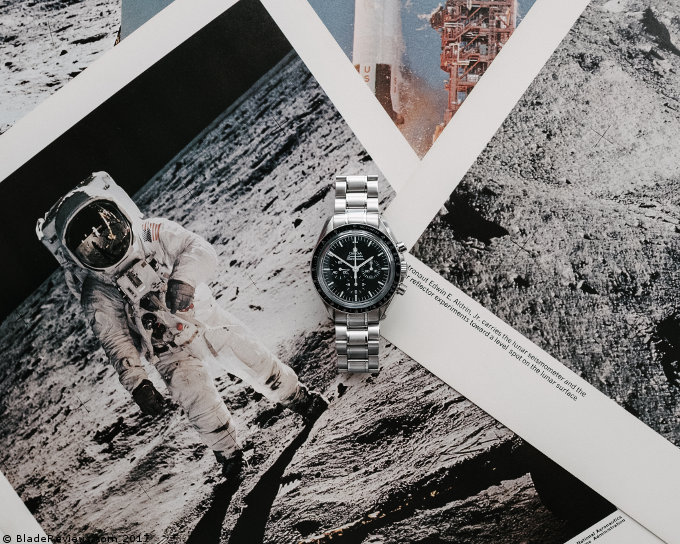
Alright, so about a review. This watch has been my constant companion, on and off, for several years now. I have consistently been a fan for years. It’s just worth you knowing that on the front end.
Let’s go over some basic specs:
- Case Width: 42mm (roughly 43 with the crown)
- Lug to Lug: 46.6MM
- Case Height: 13.8mm
- Weight: 5.3oz on Bracelet 3.1 on nato
Fit
The Speedmaster wears larger than you might think. 42mm isn’t a small watch but by today’s standards it’s not a large one either. They make large case sizes for Speedmasters, in particular their coaxial models, but I am specifically reviewing the “Speedmaster Professional.” With all that said, the Speedmaster wears very nicely. With the 46mm lug to lug it is noticeable and with a good wrist presence, but not something that will become a burden to wear.
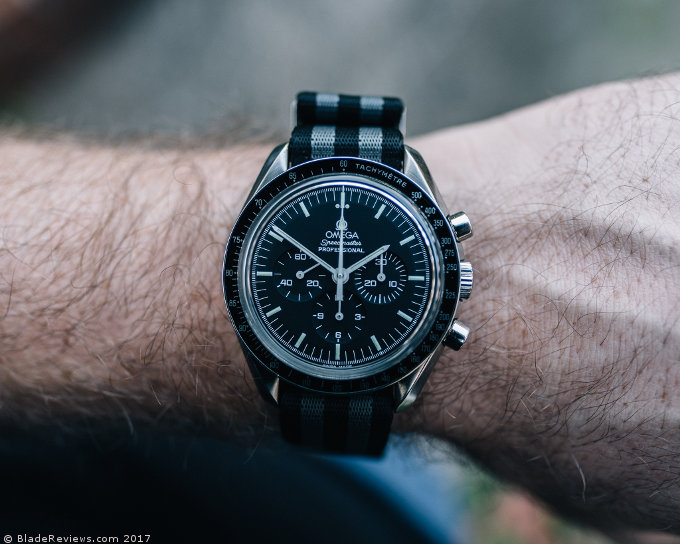
Movement
In 1957 when the Speedmaster released it was using the Omega 321 movement which was a column wheel chronograph, manual wind, movement. In 1968 Omega replaced that with the 861. The 861 was a cam operated chronograph that beat at a faster rate than the 321. All modern Omega Speedmaster Professionals use versions of this movement. The particular Speedmaster I have is a 3573 or Sapphire Sandwich that has a sapphire display back. It has a 1863 movement only difference between the 63 and the 61 is that the 63 is decorated. My experience with the movement has been really great. I had it serviced right when I got it, and ever since it’s been consistently keeping COSC time.
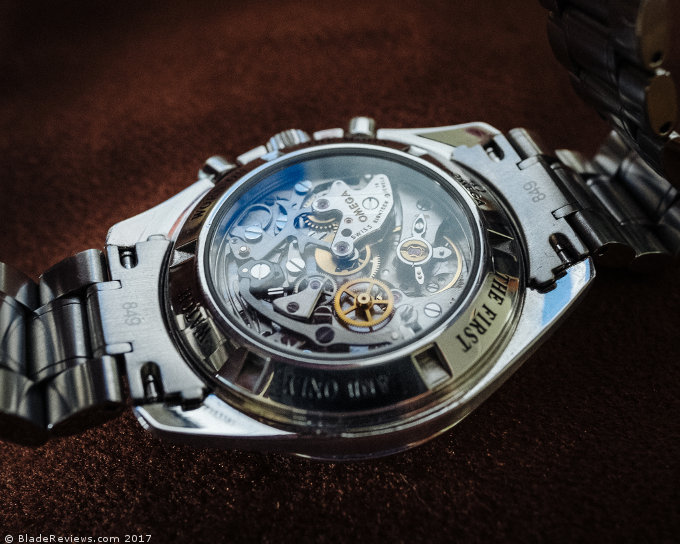
Case/Crown
The case of the Speedmaster Pro is a case study in simplicity and grace. It has subtle transitions from brushing to polished surfaces, and very graceful arcs in the lines as the case move outwards to the lugs. Most people, with a piece like this, often want it to make a statement, and the Speedmaster does that on the wrist very well. If I could levy one negative criticism of the Speedy Pro it would be that the crown is small, and on a hand wound watch that can be aggravating at times.
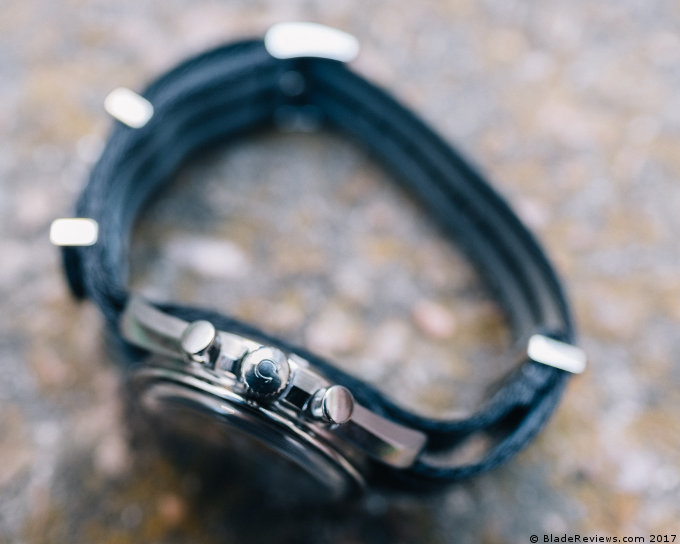
Dial, Bezel, and Crystal
On the Speedmaster let’s start with the crystal. The Speedmaster has one of the most noticeable crystals in the watch-world. This massively domed crystal sticks up past the bezel. On the regular Speedmaster that crystal is a hesalite (or acrylic). This is softer and can scratch easily, but it can also be polished out using a gentle compound. On my particular Speedmaster the crystals are sapphire. The bezel surrounding the crystal is a tachymeter scale. This is designed to determine speed.
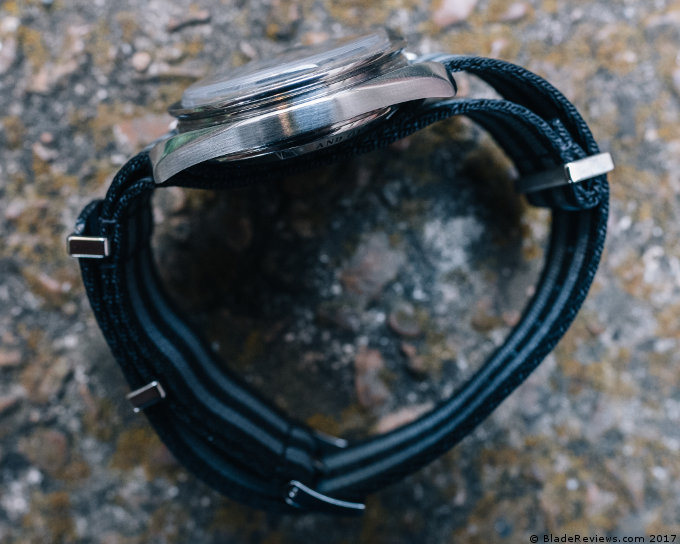
The dial itself is simple in the most complex way possible. We have three sub dials, the right hand dial is the minute counter, the lower middle is the hour counter, and the far left is the ticking seconds. The hour and minute markers are simple white, with lume on all the hours, and the hands are slender white hands, nicely lumed. The white contrasts very well with the black dial making everything very legible and time acquisition quick on such a busy watch.
Strap/Bracelet
The Speedmaster bracelet is one of Omega’s nicer bracelets, comfortable with plenty of customization to make sure it fits you well. The links are held together by a pin/collar system that isn’t as difficult to size as Seiko’s but it still sends me to the Omega boutique to get it sized correctly. The watch also came with an OEM NATO strap… Now while the price on these straps by themselves is insane (+/- $125) it’s easily the best made NATO I’ve ever used.
The Speedmaster is a great watch to have an assortment of straps for. It also wears on leather very well if you’re not into steel bracelets as much. It’s also a great watch to wear on a NATO and I think it would look at home on almost anything except maybe rubber.
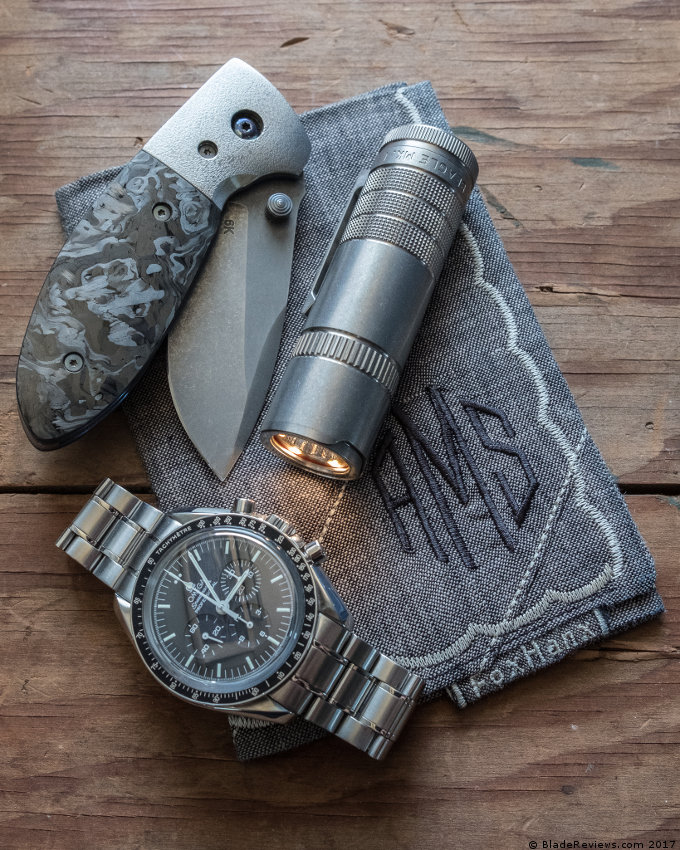
Omega Speedmaster Professional Review – Final Thoughts
It should be pretty clear by this review that I am a huge Speedmaster fan-boy. I think that if I had to own only one watch, it would be some flavor of a Speedmaster. Now how does the Speedmaster work for someone that might be not a super-fan but does like watches? It’s a good general use piece if you’re not going near water. They have a rated depth rating of 50 meters but I wouldn’t take it swimming unless by accident. The watch wears well, keeps great time, and has one of the more useful complications, a chronograph. It’s a watch with enough history and provenance that it can be something you talk about with friends and not come off as “the weird watch dude.” Maybe I’m the only one that has that problem.
Anyway, I can’t recommend the Speedmaster enough. Give yourself enough time to consider all the options that Omega has, surely there’s a config of this watch that will suit nearly every wearer.
- Stainless steel case with a stainless steel bracelet. Fixed stainless steel with black PVD with tachymeter bezel. Black dial with silver-tone hands and index hour markers. Minute markers around the outer rim. Dial Type: analog. Luminescent hands and markers.
- Chronograph - sub-dials displaying: three - 60 second, 30 minute and 12 hour. Hand wind movement. Omega calibre 1861 engine. Scratch resistant hesalite crystal. Pull/push crown. Solid case back. Case diameter: 42 mm. Case thickness: 14.3 mm. Round case shape. Band Width: 24.1 mm. Band length: 9.5 inches. Deployment clasp. Water resistant at 50 meters/165 feet. Functions: chronograph, tachymeter, hour, minute, second. Dress watch style. Watch label: Swiss made.
- Mechanical-hand-wind Movement
- Case Diameter: 42mm
- Water Resistant To 165 Feet
I recommend purchasing the Speedmaster Professional at Amazon. Please consider that purchasing anything through any of the links on this website helps support BladeReviews.com, and keeps the site going. As always, any and all support is greatly appreciated. Thank you very much.
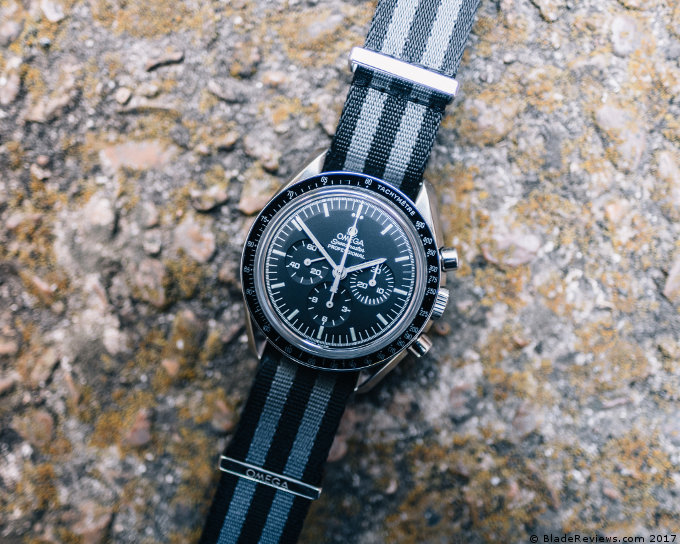
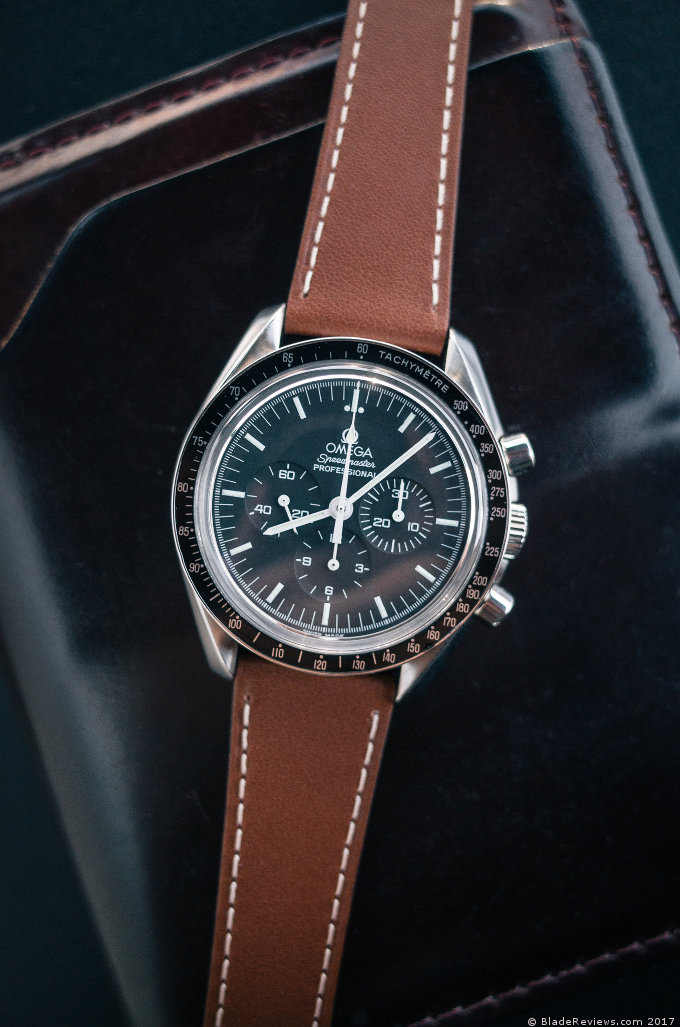

I have had a this Omega , and also the sold gold version , for years. They are both unique, simple , clean, bug yet complicated in its own right. I love them so much, I would never depart with them😢